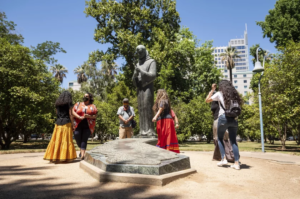Two US professors have withdrawn their affiliation from George Washington University’s (GWU) programme on extremism, following a report that the programme’s director had been involved in a coordinated campaign to label several Muslim organisations as being linked to terrorism.
“Before affiliating I should have done my due diligence about the director’s research and professional activities; I didn’t and I regret that. To be extremely clear: I condemn in the strongest possible terms Islamophobia,” said Hilary Matfess, an assistant professor at the University of Denver and former fellow at GWU’s extremism programme.
A day after Matfess publicly announced her withdrawal from the programme, Cynthia Miller-Idriss also announced that she would do the same.
Miller-Idriss, founding director of American University’s polarisation and extremism research and innovation lab (Peril) and now former fellow of GWU’s extremism programme, said that she was not in a paid position with the programme, but still wanted her name removed after the article was published.
“While my role was in name only- unpaid & w/no obligations, & I saw it as a courtesy- I refuse to lend legitimacy to an organization w/such an egregious ethical breach,” Miller-Idriss said on Twitter.
“I too feel I should have done better diligence before agreeing to join, & I apologize to all Muslim organizations in particular who were directly harmed by these false, slanderous claims that came from leader whose organization had my name attached to it.”
Middle East Eye reached out to George Washington University and its programme on extremism for comment but did not receive a response by the time of publication.
Last month, The New Yorker published a lengthy report in which it alleged that Alp Services, a Geneva-based private intelligence firm headed by Mario Brero, pitched a campaign to the UAE to smear several Muslim organisations in Europe, including the UK-based, Islamic Relief Worldwide (IRW).
The report said that Brero had paid Lorenzo Vidino, director of GWU’s programme on extremism, thousands of euros for “interesting leads/rumours” about the Muslim Brotherhood, as well as a “list of alleged members of the first tier organisations in European countries”.
Middle East Eye reached out to Vidino for comment on the two professors but did not receive a response by the time of publication.
Islamic Relief charity
According to the report, Alp attempted to link Heshmat Khalifa – a member of IRW’s board of trustees – to terrorism, following his work with an Egyptian humanitarian organisation in Bosnia during the 1990s.
After that attempt failed, Alp trawled through Khalifa’s social media history where they found several antisemitic posts shared by the board member after Israel’s 2014 offensive in Gaza, which was shared with the Times of London newspaper in 2020.
Khalifa immediately resigned from the charity and IRW’s chief executive condemned the posts, calling them appalling and “unacceptable”.
As a result of the news articles on IRW, the UK’s Charity Commission and Sweden’s International Development Agency launched investigations into the charity, while Germany ceased funding to the organisation altogether.
Banks also threatened to “stop transferring Islamic Relief funds to crisis zones around the world”, according to the magazine.
IRW told The New Yorker that it spent hundreds of thousands of dollars to pay for “outside audits, suppress false information in Internet-search results, and restore its good relations with governments”.
It also paid for an independent commission – headed by the former attorney general of England, Dominic Grieve – which concluded that IRW was a “highly effective charity” that was free of institutional antisemitism.
The New Yorker report stated that “nobody has ever credibly identified any institutional ties between the charity [Islamic Relief] and an Islamist movement”.



